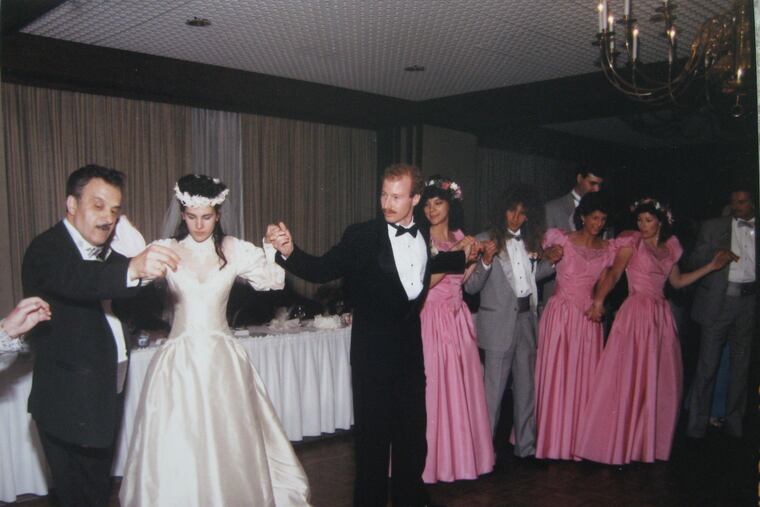Of ghosts, stories, and love from the Radnor Hotel, a Greek immigrant lesson for life. | Maria Panaritis
I imagined for years that my dead parents were still with me. On one recent night in the old St. Davids Inn, for once, maybe they really were.

They’re always there. Always with you. Even decades after going away. But inside the ballroom of the Radnor Hotel in St. Davids a few days ago, a Lancaster Avenue landmark into which I had not set foot since college, their presence was more palpable than ever.
The ghosts of Christos and Panagiota Panaritis were there — two people I had last seen in this very room dancing, in the flesh, at my sister’s wedding in 1989. They died in quick succession a few years later, me in my early 20s when dad had a fatal heart attack, and mom died of pancreatic cancer just months after the ambulance had come for dad. These once-penniless Greek immigrants from postwar Europe were tired and young and still working way too hard when it ended abruptly. That’s how life goes for some people.
You spend the next years of your young life learning to pretend that grief does not, in fact, have you by the throat. You are alone. No one really cares because you’re not their kid. You find yourself, even 20 years later, still reaching for a phone to call your mother and talk. All this time, all those weeks, months, and years, you imagine your parents are with you.
But on this night a few days ago in Radnor, for once, maybe they really were.
“My parents were not educated immigrants,” I said from a lectern inside a banquet room that, though renovated since that wedding a generation ago, still felt indescribably familiar and warm. I had forgotten my speech on the printer in my kitchen, but words nonetheless found their way to me. “They ran a small sandwich shop and this meant a lot to them. They were very proud of my being recognized by this group.”
This was no drive-by keynote. The Hellenic University Club of Philadelphia had invited me to its annual scholarship dinner. This group, founded in 1936 by Americans of Greek descent, stands for one of the greatest ideals at risk of washing out of modern U.S. culture as our politics and polarization become toxic.
Formed when 10th and Spruce Streets in Center City was home to some of the most culturally influential diaspora Greeks in the world, the HUC formed around a single principle: devotion to the ancient Greek notion of lifelong learning as a path toward civility.
It is called paideia (think “encyclopedia.”). When embedded into the DNA of any great society, this idea — of being engaged with learning, of being a mindful citizen — serves to civilize and bind us all.
A society built by people who cherish knowledge helps ensure that we are spending our time on earth as more than just free-market bulls blasting our way through a china shop. It forges compassion and the wisdom to live a moral life.
Here I was, kid of sandwich makers, speaking to maybe 100 university mathematicians and computer scientists, financial-industry professionals, and youngsters heading to college. I was at the lectern three decades after being at a table as one of this club’s scholarship recipients.
Our parents’ deaths in the early 1990s effectively severed my two sisters and me from the immigrant Greek community to which our parents had belonged since coming here after World War II. But in this room in Radnor on May 30, I learned that I had not, as I had thought, faded to black. This group, some of whose founding members had known my father from afar, had been following my byline for years.
I had not been so alone, after all.
Stories had kept us all connected.
This is why stories were the subject of my sermon. We need to know our stories and each other’s. We must discard the garbage propaganda that legitimate news is “fake news.” This is how power-mongering leaders strip a nation of its humanity. This is how civilization begins to crumble.
The immigrant story, at its core, reveals herculean sacrifice, bravery, and hope in pursuit of liberty. I noticed as I said this that a banquet worker had stopped moving. He was staring quietly as I spoke. Humbling, too, was the scrum of attendees who approached me afterward to talk.
“Thank you,” said one woman. “You said what everyone has been thinking but no one has been saying.”
As I walked out, I thought some more about my older sister’s wedding. The last time I was in this place I had real, live parents. Then, a few days later, without knowing I had given this speech, my sister posted wedding photos I hadn’t seen in decades. This, too, felt otherworldy.
Gone is the old St. Davids Inn name. But in its ballroom there remains enough room for a love that never dies — and a story with no end.